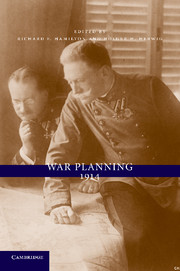Book contents
- Frontmatter
- Contents
- List of Maps
- Contributors
- Acknowledgments
- 1 War Planning: Obvious Needs, Not So Obvious Solutions
- 2 Austria-Hungary
- 3 German War Plans
- 4 War Planning and Initial Operations in the Russian Context
- 5 France
- 6 Great Britain
- 7 Italy
- 8 Conclusions
- Appendix: Suggested Reading
- Index
- References
3 - German War Plans
Published online by Cambridge University Press: 27 January 2010
- Frontmatter
- Contents
- List of Maps
- Contributors
- Acknowledgments
- 1 War Planning: Obvious Needs, Not So Obvious Solutions
- 2 Austria-Hungary
- 3 German War Plans
- 4 War Planning and Initial Operations in the Russian Context
- 5 France
- 6 Great Britain
- 7 Italy
- 8 Conclusions
- Appendix: Suggested Reading
- Index
- References
Summary
Imperial Germany, unified just over forty years before the outbreak of World War I, was the result of war – Prussia's victories in the wars of 1864, 1866, and 1870–71. It is tempting, of course, to view the history of Imperial Germany as one that inevitably led to the war of 1914, given such violent beginnings and given that we know how it ended, but there was nothing preordained or inevitable about the German Empire's demise. Rather, successive political and military leaders were responsible for Germany's increasing international isolation. At the heart of Europe and surrounded by potential enemies, its fate was, arguably, sealed when the cautious diplomacy of Otto von Bismarck was abandoned in favor of Kaiser Wilhelm II's impulsive and willful foreign policy.
Coupled with this was a pronounced influence of certain military leaders and indeed of all things military. Germany's political leaders exerted little or no control over military decision-makers and war planning was conducted by them almost in a vacuum. Convinced of Germany's increasing “encirclement,” the country's successive chiefs of the General Staff had the unenviable task of trying to prepare the German army for a future war in which the country might well be surrounded by hostile neighbors whose military manpower far outweighed that of Germany. Put differently, the General Staff's planning had to reflect the diplomatic context of the European system as well as the power potential of likely future opponents.
- Type
- Chapter
- Information
- War Planning 1914 , pp. 48 - 79Publisher: Cambridge University PressPrint publication year: 2009
References
- 1
- Cited by



